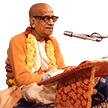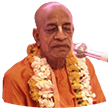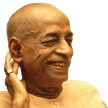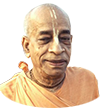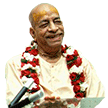Devotees Cannot...- an essential subject: Difference between revisions
(Created page with "Category:Essential Subjects <!----------------------- edit below this line -----------------------> <!------------------------ begin introduction text below --------------...") |
(Vanibot #0041: Moves Choose Another box to the end) |
||
| Line 2: | Line 2: | ||
<!----------------------- edit below this line -----------------------> | <!----------------------- edit below this line -----------------------> | ||
<!------------------------ begin introduction text below ------------------------> | <!------------------------ begin introduction text below ------------------------> | ||
The Lord is so kind that even if a devotee of the Lord cannot fulfill the complete course of devotional service unalloyed and uncontaminated by material association, he is given another chance in the next life by being awarded a birth in the family of a devotee or rich man so that without being engaged in the struggle for material existence the devotee can finish the remaining purification of his existence and thus immediately, after relinquishing the present body, go back home, back to Godhead. This is confirmed in the Bhagavad-gītā | The Lord has supreme consciousness, however one should not claim that the jīva, the living entity, is also supremely conscious. The living being cannot be supremely conscious at any stage of his perfection, and the theory that he can be so is a misleading theory. As conscious as he may be, he is not perfectly or supremely conscious. The Lord is so kind that even if a devotee of the Lord cannot fulfill the complete course of devotional service unalloyed and uncontaminated by material association, he is given another chance in the next life by being awarded a birth in the family of a devotee or rich man so that without being engaged in the struggle for material existence the devotee can finish the remaining purification of his existence and thus immediately, after relinquishing the present body, go back home, back to Godhead. This is confirmed in the Bhagavad-gītā. | ||
Srila Prabhupada's books, lectures, conversations and letters offer a comprehensive presentation of this essential subject as seen in the Vaniquotes '''[[Vaniquotes:Category:A Devotee Cannot...|Devotees Cannot...]]''' category. An introduction from his books is given below in the following | Srila Prabhupada's books, lectures, conversations and letters offer a comprehensive presentation of this essential subject as seen in the Vaniquotes '''[[Vaniquotes:Category:A Devotee Cannot...|Devotees Cannot...]]''' category. An introduction from his books is given below in the following 12 quotes. | ||
<!-------- end introduction text and don't touch next three lines ---------> | <!-------- end introduction text and don't touch next three lines ---------> | ||
---- | ---- | ||
== Quotes from Srila Prabhupada's books == | == Quotes from Srila Prabhupada's books == | ||
<!----------------- edit quote boxes below this line -----------------> | <!----------------- edit quote boxes below this line -----------------> | ||
{{VaniQuotebox|It is said that anyone who has implicit faith in the service of the Lord, or who actually engages in transcendental loving service, has all the good qualities of the demigods. Therefore, a devotee cannot be at fault| It is said that anyone who has implicit faith in the service of the Lord, or who actually engages in transcendental loving service, has all the good qualities of the demigods. Therefore, a devotee cannot be at fault. '''(Śrīmad-Bhāgavatam 3.6.25)'''}} | {{VaniQuotebox|It is said that anyone who has implicit faith in the service of the Lord, or who actually engages in transcendental loving service, has all the good qualities of the demigods. Therefore, a devotee cannot be at fault|It is said that anyone who has implicit faith in the service of the Lord, or who actually engages in transcendental loving service, has all the good qualities of the demigods. Therefore, a devotee cannot be at fault. '''(Śrīmad-Bhāgavatam 3.6.25)'''}} | ||
{{VaniQuotebox|A devotee, once accepted by the Lord, can never fall down| A devotee, once accepted by the Lord, can never fall down. '''(Śrīmad-Bhāgavatam 3.6.29)'''}} | {{VaniQuotebox|All glories unto you." A devotee, once accepted by the Lord, can never fall down|It would have been impossible for inhabitants of Vaikuṇṭha to come back to this material world simply because of a brahminical curse. The Lord especially blesses the so-called culprits: "All glories unto you." A devotee, once accepted by the Lord, can never fall down. That is the conclusion of this incident. '''(Śrīmad-Bhāgavatam 3.6.29)'''}} | ||
{{VaniQuotebox|A devotee cannot be defeated by any opponents. A devotee, therefore, should not deviate knowingly from the path of devotion. The adherent devotee is assured all protection from the Supreme Personality of Godhead|Wherever there is the Supreme Personality of Godhead, Kṛṣṇa, and His devotee Arjuna, Pārtha, there is victory, opulence, extraordinary power and morality. The opulences of a devotee are not a result of karma-kāṇḍa-vicāra. A devotee is always protected by all of the Supreme Lord's opulences, of which no one can deprive him. Thus a devotee cannot be defeated by any opponents. A devotee, therefore, should not deviate knowingly from the path of devotion. The adherent devotee is assured all protection from the Supreme Personality of Godhead. '''(Śrīmad-Bhāgavatam 10.2.33)'''}} | {{VaniQuotebox|A devotee cannot be defeated by any opponents. A devotee, therefore, should not deviate knowingly from the path of devotion. The adherent devotee is assured all protection from the Supreme Personality of Godhead|Wherever there is the Supreme Personality of Godhead, Kṛṣṇa, and His devotee Arjuna, Pārtha, there is victory, opulence, extraordinary power and morality. The opulences of a devotee are not a result of karma-kāṇḍa-vicāra. A devotee is always protected by all of the Supreme Lord's opulences, of which no one can deprive him. Thus a devotee cannot be defeated by any opponents. A devotee, therefore, should not deviate knowingly from the path of devotion. The adherent devotee is assured all protection from the Supreme Personality of Godhead. '''(Śrīmad-Bhāgavatam 10.2.33)'''}} | ||
{{VaniQuotebox| | {{VaniQuotebox|A devotee's achievement, however, is never lost by the influence of time. Even if a devotee cannot completely execute devotional service, in his next life he begins from the point where he left off|Unless one is fully situated in unalloyed devotional service, there is no guarantee of liberation, even if one is elevated to the heavenly planets or to the impersonal Brahman effulgence. A devotee's achievement, however, is never lost by the influence of time. Even if a devotee cannot completely execute devotional service, in his next life he begins from the point where he left off. '''(Śrīmad-Bhāgavatam 4.24.56)'''}} | ||
{{VaniQuotebox| | {{VaniQuotebox|It is said that anyone who has implicit faith in the service of the Lord, or who actually engages in transcendental loving service, has all the good qualities of the demigods. Therefore, a devotee cannot be at fault|It is said that anyone who has implicit faith in the service of the Lord, or who actually engages in transcendental loving service, has all the good qualities of the demigods. Therefore, a devotee cannot be at fault. If sometimes it is found that he is in error by accident or by some temporary arrangement, that should not be taken very seriously. '''(Śrīmad-Bhāgavatam 3.16.25)'''}} | ||
{{VaniQuotebox| | {{VaniQuotebox|Even if a devotee of the Lord cannot fulfill the complete course of devotional service unalloyed and uncontaminated by material association, he is given another chance in the next life by being awarded a birth in the family of a devotee or rich man|The Lord is so kind that even if a devotee of the Lord cannot fulfill the complete course of devotional service unalloyed and uncontaminated by material association, he is given another chance in the next life by being awarded a birth in the family of a devotee or rich man. '''(Śrīmad-Bhāgavatam 2.7.49)'''}} | ||
{{VaniQuotebox| | {{VaniQuotebox|Some great devotees of the Lord cannot surpass the boundary of awe and veneration. But other devotees are in such an intense compact of love with the Lord that they forget His exalted position and regard themselves as His equals or even His superiors|Some great devotees of the Lord cannot surpass the boundary of awe and veneration. But other devotees are in such an intense compact of love with the Lord that they forget His exalted position and regard themselves as His equals or even His superiors. These eternal associates of the Lord relate with Him in the higher statuses of friendship, parenthood, and consorthood. '''(Mukunda mālā-stotra, Text 2)'''}} | ||
{{VaniQuotebox| | {{VaniQuotebox|The progress of culturing knowledge by the jnanis or the bodily gymnastics by the yogis are ultimately given up by the respective performers, but a devotee of the Lord cannot give up the service of the Lord|The progress of culturing knowledge by the jñānīs or the bodily gymnastics by the yogīs are ultimately given up by the respective performers, but a devotee of the Lord cannot give up the service of the Lord. '''(Śrīmad-Bhāgavatam 2.8.6)'''}} | ||
{{VaniQuotebox|Devotees cannot be situated in the impersonal Brahman effulgence, into which impersonalists desire to merge|Devotees cannot be situated in the impersonal Brahman effulgence, into which impersonalists desire to merge. The devotees are placed in Vaikuṇṭhaloka or Kṛṣṇaloka. '''(Caitanya-caritāmṛta, Ādi-līlā 5.36)'''}} | {{VaniQuotebox|Devotees cannot be situated in the impersonal Brahman effulgence, into which impersonalists desire to merge|Devotees cannot be situated in the impersonal Brahman effulgence, into which impersonalists desire to merge. The devotees are placed in Vaikuṇṭhaloka or Kṛṣṇaloka. '''(Caitanya-caritāmṛta, Ādi-līlā 5.36)'''}} | ||
| Line 39: | Line 39: | ||
'''Devotees Cannot... - [[Vaniquotes:Category:A Devotee Cannot...|explore more within this category]]'''. | '''Devotees Cannot... - [[Vaniquotes:Category:A Devotee Cannot...|explore more within this category]]'''. | ||
{{EsentialSubjectTotal}} | {{EsentialSubjectTotal}} | ||
<div style="float:left;"> | |||
{{EssentialSubjectnav}} | |||
</div> | |||
__NOTOC__ | __NOTOC__ | ||
__NOEDITSECTION__ | __NOEDITSECTION__ | ||
Latest revision as of 16:08, 22 November 2020
The Lord has supreme consciousness, however one should not claim that the jīva, the living entity, is also supremely conscious. The living being cannot be supremely conscious at any stage of his perfection, and the theory that he can be so is a misleading theory. As conscious as he may be, he is not perfectly or supremely conscious. The Lord is so kind that even if a devotee of the Lord cannot fulfill the complete course of devotional service unalloyed and uncontaminated by material association, he is given another chance in the next life by being awarded a birth in the family of a devotee or rich man so that without being engaged in the struggle for material existence the devotee can finish the remaining purification of his existence and thus immediately, after relinquishing the present body, go back home, back to Godhead. This is confirmed in the Bhagavad-gītā.
Srila Prabhupada's books, lectures, conversations and letters offer a comprehensive presentation of this essential subject as seen in the Vaniquotes Devotees Cannot... category. An introduction from his books is given below in the following 12 quotes.
Quotes from Srila Prabhupada's books
Devotees Cannot... - explore more within this category.
Vanipedia has now over 903 introductory articles compiled from Srila Prabhupada's books under the series titled Essential Subjects. All these articles can be seen in the Table of Content on the right side of this article and also here in this Umbrella Category. Browse through them to relish the breadth and depth of Srila Prabhupada's teachings - There is a subject for everyone.
